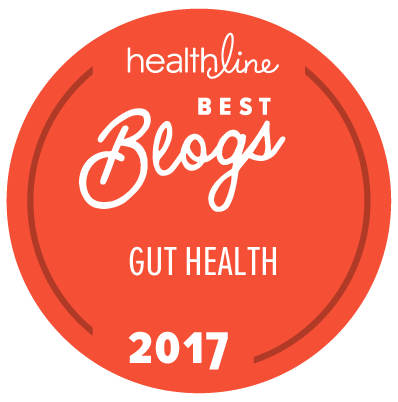 Eat Empowered
Eat Empowered  Gut Health
Gut Health  Healthy Eating Tips
Healthy Eating Tips  Inflammation
Inflammation  Wellness Advice from Experts
Wellness Advice from Experts
6 Surprising Causes of Digestive Distress
Home » Eat Empowered » Gut Health » 6 Surprising Causes of Digestive Distress
By Danielle Capalino, MSPH, RD, NLC
I spend a lot of my time talking about how FODMAPs can lead to digestive distress. However, there are many other foods that can trigger uncomfortable (and embarrassing) tummy troubles.
RELATED: What the Heck is a FODMAP?
And issues like bloating are not just a pain—an out-of-whack digestive system seriously affects your overall health.
RELATED: The Gut-Brain Connection, Explained
If you suspect food is causing your symptoms, you’re probably right. Here’s what you can do: Go through this list, and if there’s something on it that’s a regular (or really major!) part of your routine, consider eliminating it for a time to see if your symptoms dissipate. Then, use that information to design a diet for yourself that takes your very own individual digestive system into account.
Surprising Causes of Digestive Distress
Caffeine
You may notice that your morning coffee helps your morning routine along by keeping your digestive system moving. That happens because caffeine is a stimulant and can speed up your digestive tract. Unfortunately, that means it can also be a serious irritant and contribute to urgent bathroom runs and painful acid reflux.
Alcohol
Even if you’re drinking responsibly, a couple of glasses of wine can still lead to issues like heartburn or diarrhea, depending on your body.
Carbonation
Carbonated beverages taste great, but the bubbles fill your belly with excess air. This can create pressure and cause a range of consequences from acid reflux to bloating, if you’re sensitive to it.
Gum
Similar to drinking carbonated beverages, when you chew gum you swallow a lot of excess air. It’s also frequently made with artificial sugars that can upset your stomach.
Fried Foods
It’s pretty universally acknowledged that fried foods are not good for your health (hello, inflammation!). Eating them can cause acid reflux and just plain upset your belly.
High-Fat Foods
While there are many benefits to eating certain high-fat foods, fat can seriously slow down your digestion. Sometimes, that’s a good thing, but if your digestive system is sluggish to begin with, it could lead to issues. If this is you, space out foods high in good fats or try eating them on their own (as a snack, for example) rather than as part of a big meal that will require a whole lot of digesting.

Danielle Capalino, MSPH, RD, is a registered dietitian in New York City who provides nutritional counseling on digestive health. She is a graduate of the Massachusetts Institute of Technology and the Johns Hopkins School of Public Health and is Nutritious Life Certified. Learn more at www.daniellecapalino.com.
 Healthline |
The Nutritious Life Editors are a team of healthy lifestyle enthusiasts who not only subscribe to — and live! — the 8 Pillars of a Nutritious Life, but also have access to some of the savviest thought leaders in the health and wellness space — including our founder and resident dietitian, Keri Glassman. From the hottest trends in wellness to the latest medical science, we stay on top of it all in order to deliver the info YOU need to live your most nutritious life.
RECENT ARTICLES

Want a sneak peek inside the program?
Get FREE access to some of the core training materials that make up our signature program – Become a Nutrition Coach.
Get Access












































































































































































































































































































































































































































































































































































































































































































































































































































































































































































































































































































































































































































































































































































































































